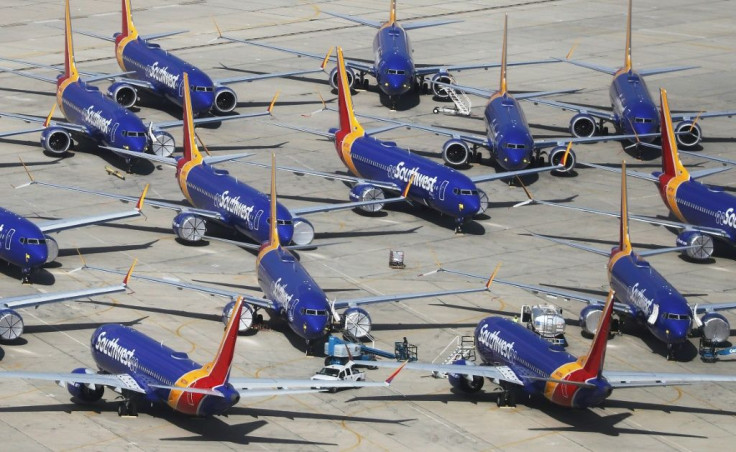Boeing Stock Down 4% As Suspension Of 737 MAX Production Looms

KEY POINTS
- Boeing announced a halt in the production of the 737 MAX jet, two of which crashed in the space of five months
- The company had 5,000 firm orders for the jet in January
- It had only 30 new orders for the plane in November
Shares of The Boeing Company, two of whose 737 MAX 8 narrow-body passenger jets crashed in October 2018 and March 2019, nosedived Monday, losing 4.3 percent in regular trading and a further 1.2 percent in after hours.
Boeing's shares ended Monday on Wall Street at $327.00 after opening at $328.53. Extended trading saw the stock drop 1.2 percent to $323.02 and left Boeing with a market cap of $184 billion.
The flak shredding Boeing's shares was triggered by the company's surprise announcement Monday it will suspend production of the 737 MAX series and its four variants by January 2020. The 737 Max was grounded worldwide in March after both fatal crashes killed all 346 passengers and crew aboard the jet. The crashes were later traced to a faulty and new autopilot system that pushed the plane's nose down shortly after take-off.
A Lion Air jet plunged into the Java Sea off Indonesia in October 2018 while an Ethiopian Airlines plane dove into the ground near Addis Ababa in March. The twin disasters forced Boeing to suspend deliveries of the 737 MAX. Airlines around the world grounded their 737 MAX jets while waiting recertification of the plane by governmental airline regulators.
In the meantime, orders for the 737 MAX shriveled. It was only in November Boeing saw its first new orders for the jet, but only 30 planes were ordered. The drop in orders left Boeing with an inventory of more than 400 of the airplanes in storage. In January, Boeing said it had more than 5,000 firm orders for the plane from 78 airlines.
Despite the massive drop in demand, Boeing continued to manufacture the planes in the hopes of a quick recertification. Boeing on Monday said the continued uncertainty of the 737 MAX's future forced it to take the desperate move to suspend the plane's production. It said it will focus instead on delivering planes it already produced to reduce its huge inventory.
"We believe this decision is least disruptive to maintaining long-term production system and supply chain health," said Boeing in a statement. "This decision is driven by a number of factors, including the extension of certification into 2020, the uncertainty about the timing and conditions of return to service and global training approvals, and the importance of ensuring that we can prioritize the delivery of stored aircraft."
Boeing said safely returning the 737 MAX to service is its top priority. It said the U.S. Federal Aviation Administration (FAA) and global regulatory authorities determine the timeline for certification and return to service.
"We remain fully committed to supporting this process.”
The pause in production follows a revelation to Congress on Dec. 11 by a former senior manager at Boeing's plane production plant in Renton, Washington. Ed Pierson said he told Boeing management about his concerns regarding production problems with the Boeing 737 MAX months before the two plane crashes in Indonesia and Ethiopia.
Pierson said he witnessed troubling incidents at Renton during the production process. These included tired employees making mistakes and workers under pressure to meet deadlines. He believes these production issues have a direct link to the two crashes and to 13 other safety issues that have hit the 737 MAX.

© Copyright IBTimes 2024. All rights reserved.




















